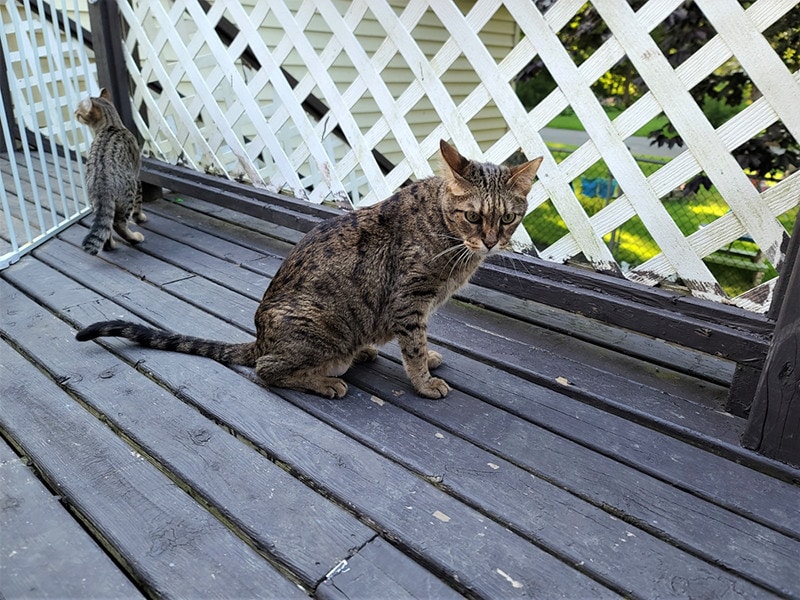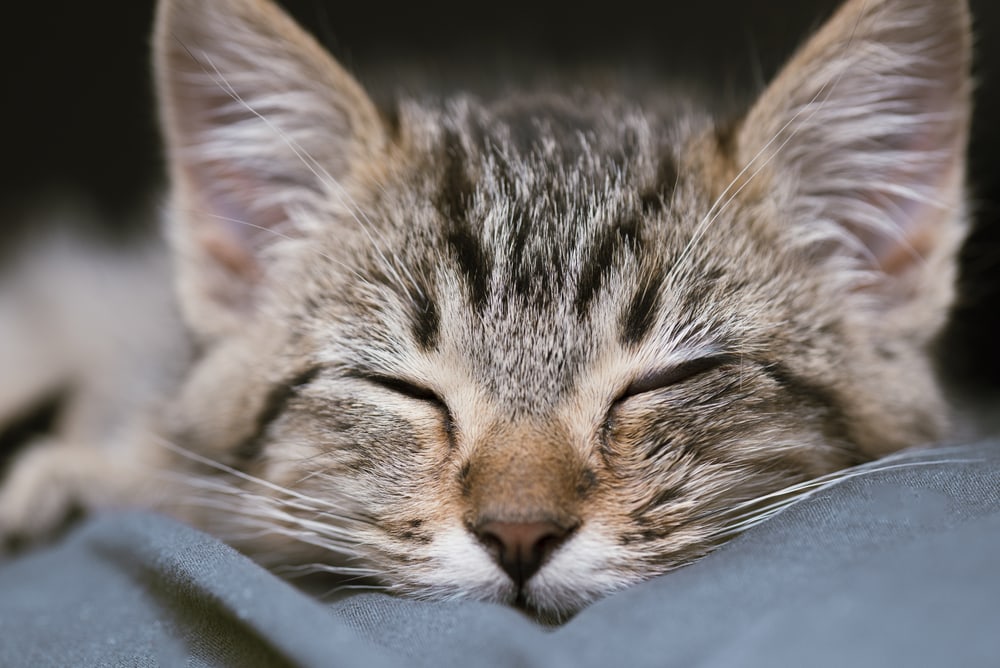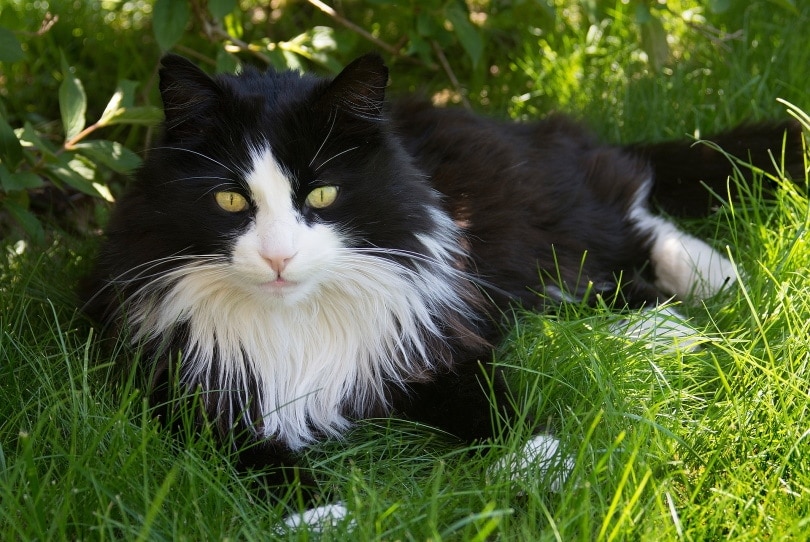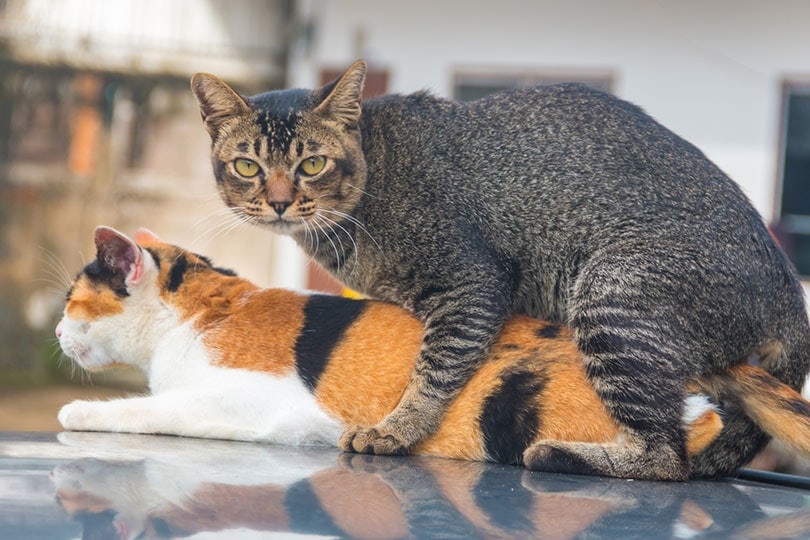F3 Savannah Cat: Rarity, Temperament, Info, & More

Updated on

Savannah cats are a relatively new type of cat that has been gaining in popularity over the past few years due to their unique look and temperament. The origin of these hybrid domestic cats lies in the combination of both wild and domestic species. They have exotic appearances that often leave people wondering if they are actually wild cats.
F3 Savannah Cats, specifically, are the most desired sub-breed within this group, making them one of the most sought-after breeds available today.
Origin of F3 Savannah Cats
To understand the origin of an F3 Savannah cat, you have to first understand the origins of Savannah cats and what an F3 is. The Savannah cat is an exotic-looking tall cat with a spotted coat that is a hybrid of an African Serval—a wild cat originally from sub-Saharan Africa—and a domestic cat. The first Savannah cat was bred in 1986 by Judee Frank and was a cross between a Serval and a Siamese cat. Some accounts say that the pairing happened by accident, and when the kitten was born, Judee was very surprised. This kitten was later called “Savannah” from which the breed gets its name and was sold on to another breeder who then paired more Servals and domestic cats.
The first generation of cats that are the offspring of a Serval and a domestic cat is known by the term F1. The “F” stands for filial and comes from Mendelian genetics. The next generation, where an F1 Savannah cat is bred with another domestic cat, creates an F2. So, an F3 Savannah cat is the offspring of an F2 and a domestic cat. With each generation, the Serval traits are less dominant, and breeders consider the F3 Savannah cat the perfect balance between the wild cat and domestic cats—however it’s worth remembering that F3 Savannah cats are still at least 12.5% pure African Serval!
Formal Recognition of Savannah Cats
The process to have Savannah cats recognized by The International Cat Association (TICA) began in 1996 when Patrick Kelley and Joyce Sroufe, assisted by TICA’s executive secretary, Leslie Bowers, submitted the first-ever Savannah cat breed standard that they had written to TICA. Unfortunately for them, TICA then placed a 2-year moratorium on registering new cat breeds, which in 1998 was extended by a further 2 years. During this time, it seemed like the Savannah would never get the recognition it deserved, but during these 4 years, many breeders tried to popularize the Savannah.
One breeder, Lorre Smith, took Savannahs to international cat shows where TICA officials and judges were introduced to these cats for the first time. In 2000 the ban on new registrations ended and Lorre Smith submitted an updated Savannah cat breed standard to TICA. Recognition for the Savannah came in February 2001 the breed received the “registration-only” status, which was followed by “exhibition-only”. The exhibition-only status was specifically for F3 Savannah cats and it meant that they could be entered at cat exhibition shows. Over a decade later, in 2012, the coveted “champion status” was finally bestowed on the breed allowing Savannah cats to compete against other cat breeds.
Temperament of F3 Savannah Cats
The F3 Savannah Cat is much closer to a domestic cat in temperament, nevertheless, it has a slightly more independent spirit that can still make it challenging at times, but also incredibly rewarding to own. Although most people find them considerably easier to manage than Servals, F1s, or F2s, they can sometimes be difficult to train due to their aloof nature and require frequent mental stimulation or they may become bored and restless. This tendency to be less wild is why third-generation Savannah cats are recommended as an entry point into Savannah cat ownership by many seasoned breeders.
These people-loving cats crave human companionship and prefer being around humans rather than being isolated from them. They bond quickly with their owners, making them excellent family pets who thrive in homes where there’s plenty of attention and love. They are the friendliest of the first three Savannah cat generations, but their temperament can still vary greatly depending on how they were raised; socialization is a key consideration when it comes to training this breed of cat.

 Top 4 Unique Facts About F3 Savannah Cats
Top 4 Unique Facts About F3 Savannah Cats
1. They can be leash-trained
It is possible to teach these cats basic commands, such as sit and stay, just like you would with a dog. They may even learn to come when called or follow you around on a leash—provided that their owners put in the effort and have the patience required for training them properly. F3 Savannahs are more inclined to take to leashed walks than many other breeds of domestic cats. Walking on a leash is a wonderful way to bond and explore together!
2. They can swim!
These hybrid felines possess some of the characteristics of their African Serval ancestors, including their powerful legs, which give them unexpected abilities such as a love of swimming! Many owners report that they have seen their F3 Savannah cats jump into pools or take short swims—although they don’t usually stay underwater for too long. It’s no surprise since many cats aren’t fond of getting wet; however, F3 Savannah cats appear to be much more accepting than most when it comes to water activities.
3. F3 male Savannah cats are sterile
It is common for male Savannah cats to be sterile up to the fifth generation, which means that F1, F2, F3, F4, and F5 Savannah male cats are not capable of reproducing. Therefore, female Savannah cats are more expensive than male Savannah cats. This makes it easier for male F3 pet owners to avoid any unexpected litters due to accidental mating with other nearby cats in the family.
4. High jumpers
These cats are able to jump up to 8 feet horizontally, which is roughly twice the height possible for an average house cat. Even more impressive is their vertical jumping capability; F3 Savannahs can reach heights of 6 feet or more in one single leap! Not only do they excel at jumping, but these cats also possess incredible climbing skills. Their long legs and strong claws enable them to scale objects with ease, making them excellent climbers as well as jumpers.
 Do F3 Savannah Cats Make Good Pets?
Do F3 Savannah Cats Make Good Pets?
On the one hand, F3 Savannahs can be affectionate, loyal, and intelligent—in ways that distinguish them from many other domestic cats. In addition, due to their untamed ancestry, these hybrid cats also tend to have higher energy levels than others. If you’re considering adopting an F3 Savannah cat as a pet, it’s important to understand both the pros and cons of owning this breed of cat.
One of the best things about owning an F3 Savannah cat as a pet is that they are incredibly smart and devoted animals. Unlike Servals, F1s, and F2s, they also tend to be reliably friendly toward children, other cats, animals, and even dogs in some cases. F3 Savannahs can be taught tricks like fetching items or jumping through hoops, making them more interesting than other domesticated pets.
On the other hand, F3 Savannahs can become easily bored without enough enrichment activities such as playtime or hunting-style food games. They may require more attention from their owners compared with other more sedentary types of domesticated cats due to their active nature. Cat trees, scratching posts, feather wands, and balls are all great toys that can keep your F3 Savannah entertained throughout the day. Additionally, you may want to try hiding treats around the house—this is an engaging game that also keeps your F3 Savannah active as they search for hidden goodies.
Final Thoughts
In conclusion, F3 Savannah cats are a unique and fascinating breed with an impressive history. They have a lively yet loving temperament and can become loyal and devoted companions if given the right amount of attention and care. Owning an F3 Savannah cat is sure to be a rewarding experience for any cat lover or pet owner—as long as you are prepared to take care of their unique needs and singular personalities.
If you’re looking for a rare, exotic pet that is both beautiful and intelligent, then the F3 Savannah cat might just be the perfect fit for you.
Featured Image Credit: Patrick Hatt, Shutterstock


 Top 4 Unique Facts About F3 Savannah Cats
Top 4 Unique Facts About F3 Savannah Cats









